
dinnerladies - cooking up laughs
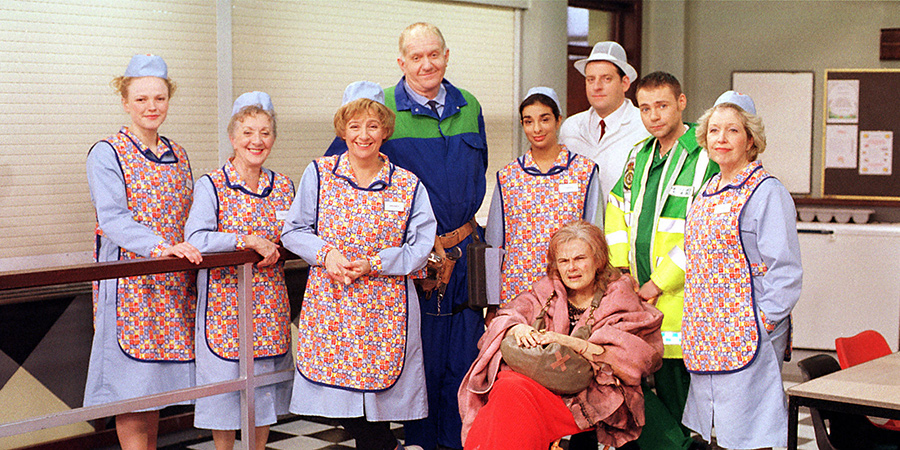
It is surprising that it took Victoria Wood until 1998 to write a sitcom, because - since starting in the business on New Faces in 1974 - Wood was one of the most prolific comedy writers in Britain.
Though they met briefly at Manchester Polytechnic in 1971, Wood began her long-standing working relationship with Julie Walters in 1978, when they were both part of the cast of In At The Death, a revue staged at the Bush Theatre. She first made an impression the same year with her play Talent, which Granada producer Peter Eckersley took to television soon after. Wood then turned her attention to sketch comedy. Although her first outing in 1982, Wood And Walters, is now mostly remembered as a nostalgic curio, it served as a prototype for the kind of comedy she would perfect a few years later in Victoria Wood As Seen On TV. She first dabbled in sitcom with 1989 anthology series Victoria Wood, in which she played a fictitious version of herself. The characters became involved in a new situation each episode. These included going to a health farm, being stuck at an airport, and hiking.
1994 saw Wood tackle a feature length comedy drama for the first time - Pat And Margaret - and, throughout all this, she kept a concurrent career as an extremely successful stand-up comic - in 1993 she sold out the Royal Albert Hall for an astonishing fifteen consecutive nights; to this day she holds the record for longest residency there by a solo female artist.
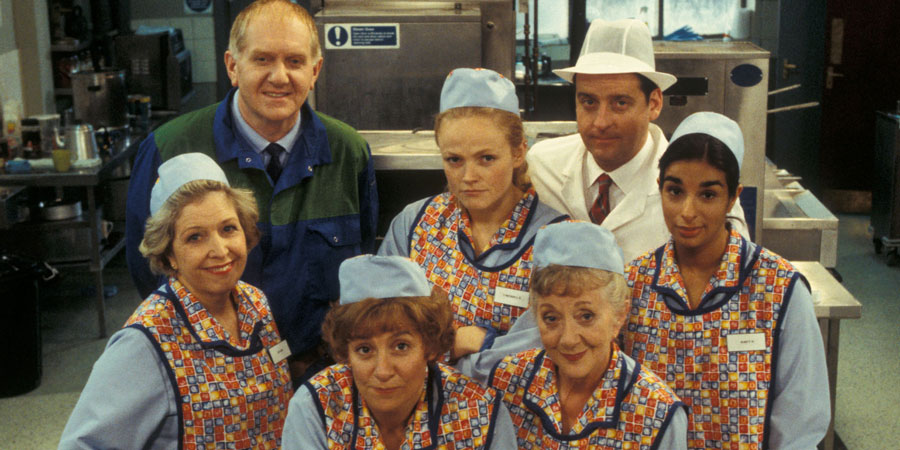
Set entirely within the confines of the kitchen and canteen area of a Manchester factory called HWD Components, the set of dinnerladies was designed to be as realistic as possible. In fact, the industrial toaster was fully operational and made copious rounds of toast, which were served to the studio audience during breaks in filming.
The majority of dinnerladies focused on the badinage between five women - Bren (Wood), old hands Dolly and Jean (Thelma Barlow and Anne Reid), youngsters Anita and Twinkle (Shobna Gulati and Maxine Peake, the latter in her debut television role), overseen by Tony (Andrew Dunn), the jaded yet jovial canteen manager. Other regular characters include officious handyman Stan (Duncan Preston) and eager HR Manager Phillipa (Celia Imrie). As with most of Wood's projects, the majority of the cast were stalwarts of her work.
The casting of Barlow and Reid was a nod to the fact that Wood was a huge fan of Coronation Street, a programme she had previously paid tribute to via a pitch perfect parody sketch in As Seen On TV, in which Wood took on the role of hardnosed harridan Ena Sharples.
Every episode of dinnerladies was recorded twice, a practice which is commonplace for American sitcoms. In the US they frequently film the dress rehearsal to gage where the laughs might land, but if was a first for British sitcom, mainly because it added a third on to the budget. This did enable any mistakes to be ironed out, and for Wood to rewrite the script once more.
In fact, according to Jasper Rees' book Let's Do It, Wood took inspiration from several American shows. Perhaps the most surprising was hospital drama ER, Wood mimicked the lower-case titles. The other was long-running sitcom Cheers, Wood wanted to capture a similar tone by having a theatrical set visited by various characters. Wood finally got to do a full on ER pastiche in All The Trimmings, in which she portrays the Women's Institute with the same intensity and pace as a hospital drama.
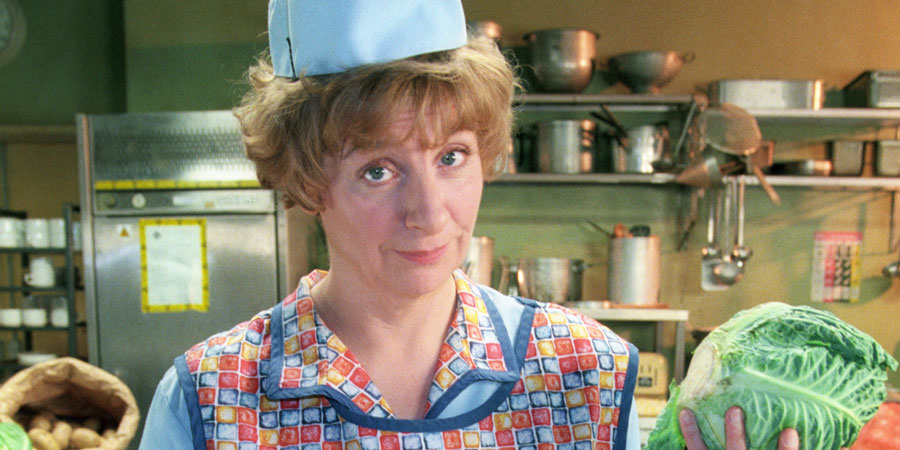
The main plot thread running through both series of dinnerladies is Bren and Tony's burgeoning romance, constantly hampered by their own insecurities. Wood wrote the show as a true ensemble piece, giving each character an overarching story, from Jean's divorce and subsequent emotional breakdown, to Tony's cancer treatment and Anita's surprise pregnancy. In the second series, Wood serialised the episodes by setting each one on a specific date, which carries the characters though a whole year.
One of the things that differentiates dinnerladies from its contemporaries is the warmth that permeates Wood's writing. These are characters who, for the most part, actually like each other, and while there is some sniping, particularly from Dolly and Jean, the humour is good natured. Bren often cracks jokes that cause the other characters to laugh, something that is surprisingly rare in sitcoms.
Wood limited Julie Walters to cameos in the majority of episodes, but Petula Gordino, Bren's mother, still manages to steal every scene in which she appears. Once again, the tragic truth is buried beneath the bonhomie - as Petula regales Bren with salacious stories of celebrities past, we know the reality is that she was a terrible mother who now lives alone in a grotty caravan parked at a petrol station. In that respect, Wood's writing was similar to Alan Bennett, not only in the very specific Northern inflection to the dialogue, but in the way her characters reveal themselves just as much through what they choose not to say. Walters delivered two Talking Heads monologues, Her Big Chance and The Outside Dog. In fact, Gordino could well have been a character from that series, because almost all of her dialogue is flannelling to avoid admitting the truth of her situation to herself, and it is only in the series finale that we finally get some closure.
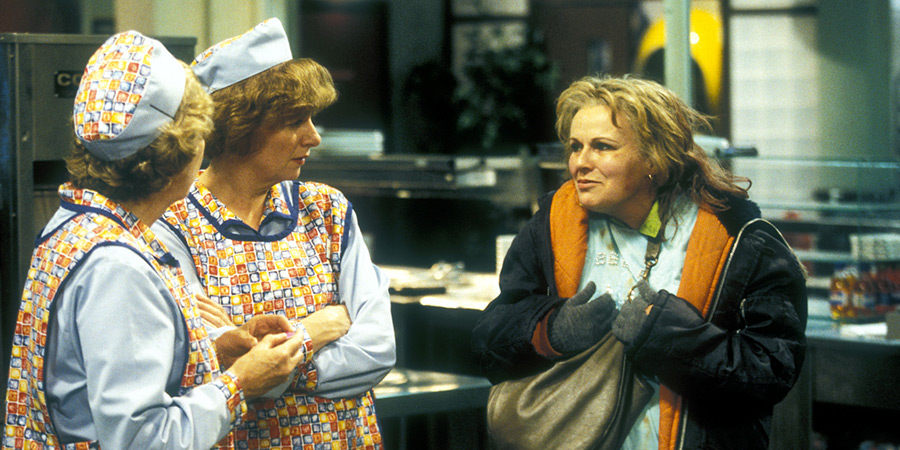
dinnerladies was something of an anachronism on the BBC at the time. Caroline Aherne and Craig Cash earned a lot of praise for their stylistic choice to make The Royle Family as a single camera show, with the emphasis on realism. By contrast, dinnerladies - which started a couple of months later - was a throwback to a bygone era, with garish colours and a studio audience. However, the two aren't as dissimilar as it may first appear. Wood's writing weaved an emotional core throughout both series, with characters experiencing grief, divorce, new relationships and giving birth. While Wood could certainly have made a superb single camera version of dinnerladies, or in the style of one of her spoof documentaries seeded throughout As Seen On TV, being a studio sitcom is integral to the success of the show. Take the line below, from Series 1 episode Scandal:
SHELAGH: Answer me one question love - Where's my Clint?
Bren's mother has shacked up with Shelagh's young son Clint and is hiding him in her caravan, the line causes the studio audience to erupt into laughter for a full fourteen seconds; an age in screentime, during which Wood and the other actors have to find a way of making such a long pause seem natural.
Ever generous in her writing, Wood gave many of the best lines to her castmates - there is a similar reaction in Moods when Petula is talking about Lauren Bacall ("How many people can look back at the end and say in the glare of the world's press 'I picked my Bogey'"), and in Party when Jean asks Tony's opinion of her new perfume ("Can you smell my Charlie?").
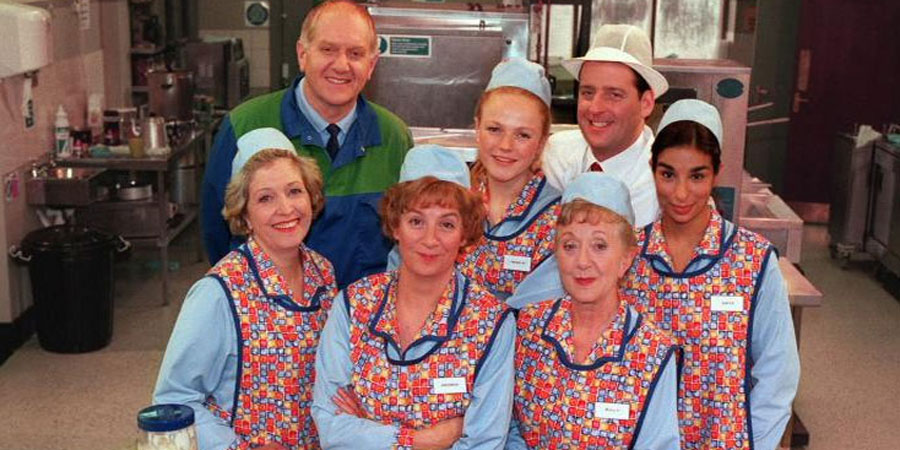
Wood was fastidious about the quality of the scripts, to the extent that she would rewrite them overnight during rehearsals, so the version of the script on the Monday would often be almost entirely different from the version that went before the cameras and the audience on Saturday. Dunn commented in Rees' book that there would often be "fear and dread" on the faces of the cast when faced with the prospect learning new lines so close to production. Reid concurred, saying that Wood "had no bedside manner at all. She'd say 'it's not funny like that'. She couldn't bear it if it wasn't perfect". While it may have been extremely difficult for the actors and crew, such attention to detail means that over two decades later, the series stands up remarkably well to repeat viewings.
One of Wood's trademarks is her delicious use of language, and she wasn't averse to writing dialogue that would be a real tongue twister for her actors, as in this exchange from Royals:
JEAN: "Are you implying I insert thrush into general conversation?"
TONY: You thrust thrush.
JEAN: I thrust thrush into the conversation?
TONY: "You do. You thrust it in, you thrash it out".
JEAN: "Are you calling me a thrush thruster?"
TONY: "And thrasher. You teeter on the thrush threshold threatening to thrash".
She always knew exactly which word would be funniest, especially when it came to place names. A good example is a speech from Gravy about moving to Scotland:
BREN: We've left everybody we know. We're in a foreign country. It's chucking it down. We're doing food nobody can eat because nobody's got any flipping teeth. Everything'll have to be deep fried. We'll forever be leaving the cooker to deal with customers sprawling over their untouched dinner with suspected heart attacks. And when we get back in the kitchen, the chip pan will have set fire to the curtains! And when we phone the fire brigade and they say 'how are you spelling that?', we'll have no idea, because everywhere in Scotland is spelt Echelfechen and pronounced Kirkcudbright".
Not content with just being the creator, writer and star of the show, Wood also wrote the theme tune. It was normally an instrumental piece, although she also wrote lyrics, which were sung only once at the end of Minnellium. She even warmed up the studio audience and introduced the cast.
Wood drew from her pool of friends to fill supporting roles throughout the series, including Richenda Carey in Royals, Lill Roughley as Shelagh, Clint's mother in Scandal, Kate Robbins made several appearances as the gormless Babs from Urmston, Sue Wallace as the strict manager who covers for Tony in Nightshift and Kay Adshead as the infuriatingly spacey Christine in the episode of the same name. Bernard Wrigley played persistently pessimistic factory worker Bob, always asking after bacon, while Sue Devaney played Jane, forever ordering "twelve rounds of white, low fat spread". The role of Norman the Breadman was shared between Andrew Livingston in Series 1 and Adrian Hood in Series 2. Dour in demeanour, a running gag sees Norman bring any conversation back round to his agoraphobia - "I fell off a diving board in Guernsey!".
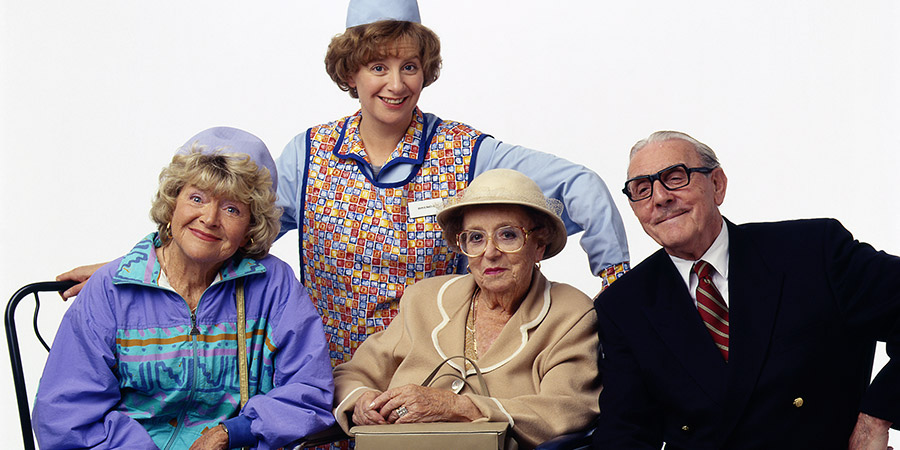
Moods, an episode from the first series, sees Phillipa organise a party for the staff and their parents in an effort to boost morale. It is testament to the quality of Wood's writing that for these roles she was able to cast the cream of the comic crop, with Dame Thora Hird as Dolly's mother Enid, Dora Bryan as Jean's mother Connie, Eric Sykes as Stan's dad Jim and Elspet Gray as Phillipa's mother Hilary. Such a cast makes Wood's dialogue sing:
JIM: That's how Chalky White copped it, bang, no head.
BREN: Was he dead?
A beat
JIM: He's never worked since.
Even characters who only appear in a single scene come fully formed, like Linda Bassett as Jean's sister Peggy, who visits after her breakdown:
PEGGY: We had two perverts in Tunstall. Luckily one of them was just visiting.
The plot thread running through the final few episodes sees Bren invited to go on Totally Trivial, a gameshow that could win her and Tony enough money to open a pub up in Scotland. At the same time, Petula goes into hospital and the stakes are raised even higher when Phillipa reveals that the factory is going to be closed down.
While Wood never wrote a third series or special, she did briefly reprise the role of Bren in Shaggy Dog Story, a promotional film featuring the great and the good of British comedy each taking a line of a long-winded story, produced to promote the BBC's comedy output. Soon after, Wood wrote Christmas sketch show All The Trimmings, which featured many of dinnerladies' regular cast, and, in 2002, embarked on what would be her final live stand-up tour. After a hugely successful West End run of Acorn Antiques: The Musical in 2005, she made what would be her final return to sketch comedy with 2009's Victoria Wood's Mid Life Christmas. In the same year, dinnerladies was adapted as a play, which toured the provinces with Dunn, Gulati and Devaney reprising their roles.
While As Seen On TV contains many of her best-known sketches, dinnerladies is Wood's masterpiece. The torturous rewriting process lead to sixteen near perfect episodes that perfectly encapsulate why Wood is revered as one of the best comic writers Britain ever had.
Where to start?
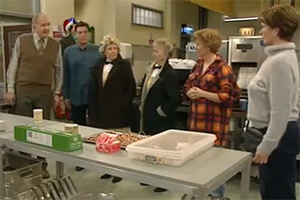
Series 2, Episode 7 - Minnellium
This episode is perhaps the perfect distillation of Victoria Wood's style, weaving huge laughs with gut punching emotion. Tensions are running high on the evening of the Millennium celebrations, with Phillipa anxious about ferrying food to HWD Component's once-in-a-lifetime-no-expense-spared dinner. These worries pale into insignificance when Tony finds a baby left on the fire escape.
Help us publish more great content by becoming a BCG Supporter. You'll be backing our mission to champion, celebrate and promote British comedy in all its forms: past, present and future.
We understand times are tough, but if you believe in the power of laughter we'd be honoured to have you join us. Advertising doesn't cover our costs, so every single donation matters and is put to good use. Thank you.
Love comedy? Find out moreDinnerladies - The Complete Collection

Includes Series 1 and 2 of the television comedy Dinnerladies.
The programme follows a group of Northern factory canteen workers who manage to find a seam of humour in their humdrum jobs. There's hard-working and normal Bren (Victoria Wood), her love-interest Tony the canteen manager, and a clutch of peculiarly eccentric characters on both sides of the counter. And then there's Julie Walters as Bren's filthy, drunken, scene-stealing mother Petula.
Dinnerladies is a classic magic blend of comedy and touching pathos.
First released: Monday 13th November 2006
- Released: Monday 24th May 2010
- Distributor: Universal Pictures
- Region: 2
- Discs: 3
- Minutes: 473
![]() Buy and sell old and new items
Buy and sell old and new items
Search for this product on eBay
BCG may earn commission on sales generated through the links above.
- Distributor: Universal Playback
- Region: 2
- Discs: 2
- Catalogue: 8245439
![]() Buy and sell old and new items
Buy and sell old and new items
Search for this product on eBay
BCG may earn commission on sales generated through the links above.

